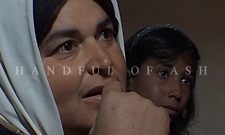Iraq: Study Says Female Genital Mutilation Widespread In North
By Golnaz Esfandiari
A survey by a German nongovernmental organization in northern Iraq suggests that female genital mutilation (FGM) is more widespread there than previously thought. FGM is practiced in 28 African countries as well as some places in Asia and the Middle East. It is also found in Europe and the United States, mainly among immigrants from the affected areas. According to the World Health Organization, FGM has immediate and long-term health consequences for women.
Prague, 21 January 2005 (RFE/RL) -- The German organization Wadi conducted the survey in the Germian area, southeast of the Kurdish city of Al-Sulaymaniyah.
Thomas Von Der Osten-Sacken is the director of Wadi, which has worked on women's issues in northern Iraq since 1993. "We have a female-led mobile team which is doing medical assistance and social assistance in that area and they interviewed a bit more than 1,500 women and girls in about 40 villages," he said. "And they found out that between 60 and 70 percent of the women in that area are circumcised, which is shocking information -- no one of us before believed that the number is that high."
He said in the absence of figures on the practice in Iraqi Kurdistan, some believed that 10 to 20 percent of women in Suleymanieh are circumcised.
Wadi now plans to conduct more extensive research on female genital mutilation (FGM) in northern Iraq. The German organization is also working on educational films to be shown in mobile cinemas in remote villages.
According to the World Health Organization, FGM -- often referred to as "female circumcision" -- comprises all procedures involving partial or total removal of the external female genitalia or other injury to the female genital organs.
Worldwide, more than 130 million girls and women are believed to have undergone female genital mutilation. And each year, 2 million girls are estimated to be at risk of undergoing FGM.
Adwoa Kwateng Kluvitse is director of the Foundation for Women's Health, Research and Development (FORWARD), a leading British NGO working to eliminate FGM.
She says that generally, people from communities where female circumcision is practiced mostly refer to religion, tradition, and customs as reasons for it: "This is not something that is being examined -- that is, what defines them as good women from their community. The other reason that is being given is that it is a religious obligation, that it is an Islamic obligation. But we know that this is not the case, as FGM isn't mentioned anywhere in the Koran and the gist of the Koran about valuing life would not support the practice of FGM. We are also very much aware that female genital mutilation predates Christianity; it predates Islam."
She says that some communities wrongly believe that amputation of the clitoris of a woman will reduce her sexual desire and make her more likely to be chaste and faithful.
She adds that FGM causes a myriad of physical and psychological problems for women: "We're talking about pain, shock, hemorrhage; the way it's done, you're talking about possible infections. Although it can't be proven, it seems very clear that it would be very much a matter of increasing the HIV/AIDS virus spread. There are also the psychological problems which we tend to overlook, but of course there is the posttraumatic stress disorder, there are the psychosexual problems, where young women are unable to have a fulfilling sex life, although there are women who say categorically that they do."
Some local women organizations have been campaigning against the practice of female circumcision in northern Iraq for a decade.
Their cause has reportedly become easier since 2001 when liberal clerics in Suleymanieh issued a fatwa, or Islamic religious order, against the circumcision of women.
But Von Der Osten-Sacken, the director of Wadi, says some clerics in the region are still supporting the practice: "We know that some -- and I really underline that -- some mullahs in some religious institutions are lobbying the idea of circumcision while others do oppose it."
But there are also positive signs: "One of our social workers from Haraman area told me that she was doing a seminar about this topic and there were about 90 women who were all circumcised and who told her that they want to stop it and they want to stop circumcising their daughters."
Despite a worldwide crusade against FMG, it remains a scourge in African countries such as Kenya, Ethiopia, Djibouti, Sudan, Somalia and Sierra Leone. There, FMG is estimated to affect 80 percent of women.
FORWARD Director Kluvitse says the worldwide crusade must continue: "I do sincerely believe that it has to end because this violence against girls cannot be allowed to continue; this is very clearly an abuse of children, it is a human rights violation, it is a gender violence issue, it is a women's issue."
For the first time last year, countries around the world observed an International Zero Tolerance Day against Female Genital Mutilation. The day will again be observed on 6 February.






 Clinton: 'Cultural Tradition' is No Excuse for Female Genital Mutilation
Clinton: 'Cultural Tradition' is No Excuse for Female Genital Mutilation


